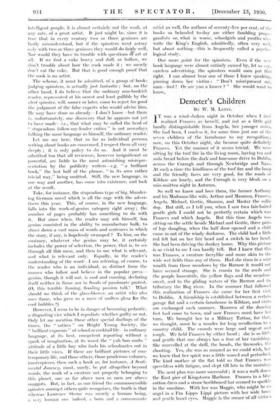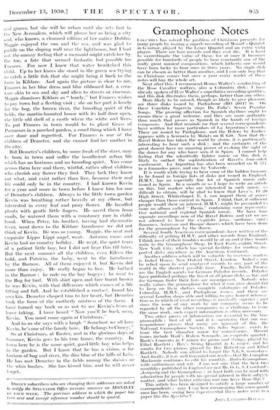• Demeter 's Children
• By W. M. Lrrrs.
T. was a 361d-shaken night in October when I fir,t• realized Frances. as' herself, and not as a little girt hardly distinguishable 'from Angela, her younger sister. She had been, I confess it, for some time just one of the Seven children of tlie •.farmhouse to • my recognition ; now, on this October night, she became quite definitely Frances yet the manner of it seems trivial. • We were Sitting by the turf fire in the Its room, having tea aml soda-bread before the dark' and lonesome drive to Dublin, across the Curragh and through NeWbridge and Naas. At such a time the kindliness of the turf fire and the lamp and the friendly faces' are very good, for the roads of Kildare are lonely, and the Curragh is 'very bleak on a rain-smitten night in Autumn.
So well we know and love them, the farmer Anthony and his' Madonna-like wife, Arthur and Maureen, Frances, Angela, Michael, Gertie, Shamus, and Master the collie dog. But still, as I tell you, when I saw two fair-haired gentle girls I could not be perfectly certain which was Frances and which Angela. But this time Angela was sitting on the settle beside Michael and Gertie, three pairs of legs dangling, when the half door opened and a child came in out of the windy darkness. The child had a little red felt hat on her fair head and a switch in her hand. She had been driving the donkey home. Why this,picture is so vivid-to me I can hardly tell. But I knew that this was Frances, a creature faerylike and more akin to the wide wet fields than any of them. Had she risen in a mist wraith from those meadows by the Barrow it would not have seemed strange. She is cousin to the reeds and the purple loosestrife, the yellow flags and the meadow- sweet, and to the gliding waters of the Barrow and its tributary the Bog river. In the summer that followed this realization of Frances she came for her first visit to Dublin. A friendship is established between a certain garage flat anil is certain farmhouse in Kildare, and visit.; are exchanged cads summer. Maureen of the dancing - feet had come to town, and now Frances must have her turn. We brought her to a Military Tattoo, for that, we thought, must be a wonder for long recollection to it country child. The crowds were large and urgent and rough. We held Frances by either hand ; she is so little and gentle that one always has a fear of her vanishing. She marvelled at the drill, the bands, the fireworks, the shooting. Yes, she was as amazed as we could wish, but we knew that her spirit was a little scared and perturbed. The kind mother at the flat told us that Frances was speechless with fatigue, and slept till late in the morning.
The next plan was more successful ; it was a walk down the East pier of Kingstown Harbour. Frances in a blue cotton dress and a straw beribboned hat seemed to sparkle in the sunshine. With her was Maggie, who might be an angel in a Fra Lippo Lippi- picture with -her wide brow and gentle hazel eyes. Maggie is the owner of all virtues and graces, but she will be -urban until she sets foot in the New Jerusalem, which will please her as being a city and, who knows, a cleansed edition of het native Dublin. Maggie enjoyed the sun and the sea; and was glad to paddle on the sloping wall near the lighthouse, but I had not the uneasy. feeling that a mermaid might catch her by the toe, a fate that seemed fantastic but possible for Frances. For now I knew that water bewitched this child. Up to her knees she stood in the green sea trying to catch a little fish that she might bring it back to the farm in Kildare. And again the picture is clear to me, Frances in her blue dress and blue ribboned hat, a crea- ture akin to sea and sky and alien to streets or cinemas. Maggie dismisses Kildare as " lonely," but Frances wishes to pay town but a. fleeting visit ; she on her part is lonely for the bog, the brown river, the brooding. quiet of the fields, the martin-haunted house with its half door open; the little old shell of a castle where the white owl lives. To put Frances in -town would be to plant Grass of Parnassus in a parched garden, a cruel thing which I have onec done and regretted. For Frances is one of the children of Demeter, and she cannot find her mother in the city.
But Demeter's children, by sonic freak of the stars, may be born in town and suffer the insufficient urban life which has no horizons and no brooding quiet. You come across them here and there, wistful, rather silent children who cherish any flower they find. They lack they know not what, and exist rather than live, because their real life could only be in the country. I had known Kevin for a year and more in town before I knew him for one of Demeter's children. Always in the little town garden Kevin was breathing rather heavily at my elbow, but interested in every leaf and puny flower. He handled plants with gentle little fingers. He saved them from snails, he watered them with a constancy rare in child- hood.- When Peter, his brother, liaving had rheumatic fever, went down to the Kildare farmhouse we did not think of Kevin. He Was so young. Maggie. the neat and exquisite Lippo Lippi angel, went. Autumn came and Kevin had no country holiday. He wept, the quiet tears of a patient little boy, but I did not hear this till later. But the next summer all the children, es-en Eileen the bold, and Patricia, the baby, 'went to the farmhouse by the Barrow. All of them enjoyed it, but Kevin did more than enjoy. He really began to live. He bathed in the Barrow ; he rode on the hay bogeys ; he went to the Bog for turf. With shirt open and face burnt brown he was Kevin, with that difference which conies of a life fitting and full. And he established a contact, found his Own kin. Demeter clasped him to her heart, but Demeter took the form of the motherly mistress of the farm. I have turned my back so as not to see Kevin's tears at leave taking. I have heard " Now you'll be back soon, Kevin. You must come again at Christmas.–
And to us she says with a laugh " Somehow we all love Kevin, he's one of the family here. He belongs to (*honey."
So at Christmas, at Easter, and in the glorious days of Summer, Kevin goes to his true home, the country. In town here he is the same quiet, good little boy who helps in the garden. But I know that he has a vision, a far horizon of bog and river, the dim blue of the hills of Lek:. He has met Demeter in the fields among the daisies or the whin bushes. She has kissed him, and he will never forget.















































 Previous page
Previous page